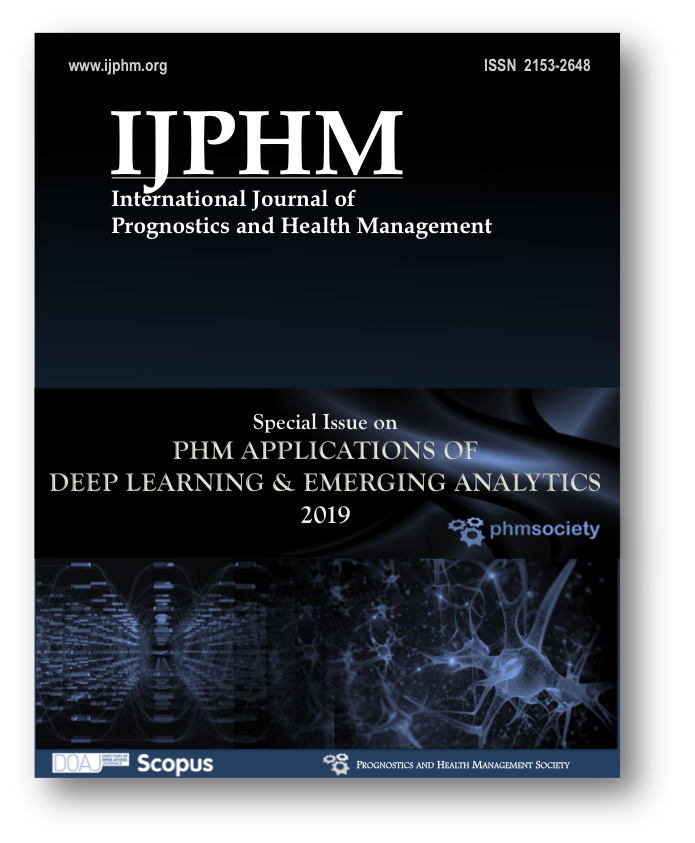Special Issue: PHM Applications of Deep Learning and Emerging Analytics
 [Download Call for Special Issue]   |
Abstract/NOI Deadline Submission Deadline June 15, 2019 The International Journal of Prognostics and Health Management (IJPHM) is the premier journal of multidisciplinary research on Prognostics, Diagnostics, and System Health Management. IJPHM is online, open access, and has no fees whatsoever to publish. This special issue focuses on theory and application of deep learning and advanced analytics to anomaly detection, condition monitoring, diagnostics, and prognostics. Deep learning has recently achieved significant breakthroughs in many different domains, including computer vision, language processing, genomics, and speech recognition; e.g., AlphaGo and AlphaZero have achieved super-human performance in complex games without human input. |
Despite these encouraging results, these techniques have seen little adoption by industry for PHM applications. There are several obstacles that need to be surmounted to enable the broad adoption of deep learning for PHM:
- Limited number of representative training samples, particularly for different types of faulty conditions and representative time-to-failure trajectories
- Appropriate benchmark datasets to compare the progress of newly developed algorithms
- Variability of operating and environmental conditions to appropriately transfer the learnt patterns between different operating conditions
- Heterogeneity of condition monitoring signals, system configurations, and operating conditions
Moreover, a number of emerging technologies – such as quantum computing, distributed ledger, blockchain, edge computing, mixed reality, explainable AI, and smart dust – hold great potential, and will undoubtedly have a profound effect on the research and application of PHM. People already doing work in these areas are truly on the cutting edge of the field.
The focus of this special issue is to provide a forum for PHM researchers and practitioners to share work and discuss the potential, applicability, benefits, challenges, and current obstacles of deep learning and emerging analytics for PHM applications. Papers describing both novel applications and related theory are encouraged, with special focus on best practices for addressing challenging industrial problems and innovative applications of techniques matured outside of PHM. We are soliciting papers on topics that include, but are not limited to:
Topics of Interest:
- Applications of deep learning and emerging analytics to PHM, focusing on how breakthroughs in other domains can be leveraged for fault detection, diagnostics, and prognostics; and what needs to be done to enable them to unleash their potential in industrial applications. The use of hybrid approaches, combining physics-based models and machine learning techniques is particularly interesting in this context.
- Innovative applications of deep learning and emerging analytics that are able to solve problems not currently sufficiently addressed using traditional PHM approaches, or that are able to overcome some of the limitations faced by traditional approaches.
Abstract/NOI Deadline March 31, 2019 April 8, 2019
(Please submit a brief Abstract and send an email to editors indicating your interest in submitting a paper by the submission deadline)
Submission Deadline June 15, 2019
We invite submission in following categories for this issue. Please refer to submission guidelines & templates.
- Technical Briefs: Technical briefs describe an instance of a PHM application using Deep Learning, the resultant impacts, and lessons learned with an emphasis on the successes and challenges of the development process and how it influenced the area/field. IJPHM Technical brief template should be used.
- Full Length Papers: Full Length Papers provide descriptive accounts of the use of Deep Learning and other emerging analytics for PHM in any domain or actual products. Techniques and apparatus used, results obtained, and lessons learned can be included to share experience with the community. Depending on level of details presented, IJPHM Full paper or Technical Brief template may be used.
- Survey Papers: Survey papers are of a tutorial or review nature covering PHM tools and approaches or describe the best current practice, detailed characteristics and performance. These papers cover areas of general interest.
Special Issue Editor:
Dr. Olga Fink (Professor for Intelligent Maintenance Systems, ETH Zürich)
Dr. Weizhong Yan (Principal Scientist, GE Global Research)
Dr. Neil Eklund (Analatom Inc. USA)
Submission Instructions (Submission are open now)
– Prepare a manuscript as per journal guidelines
– Create a submission through the website
– Select submission target as “IJPHM”, a dropdown menu will appear to select “Publication Issue”.
– Select “Special Issue Deep Learning and Emerging Analytics” option
– provide all authors names and other details for the paper including the manuscript.
Invitation to Present:
Accepted papers are eligible for podium presentation at Annual Conference of the PHM Society 2019.
